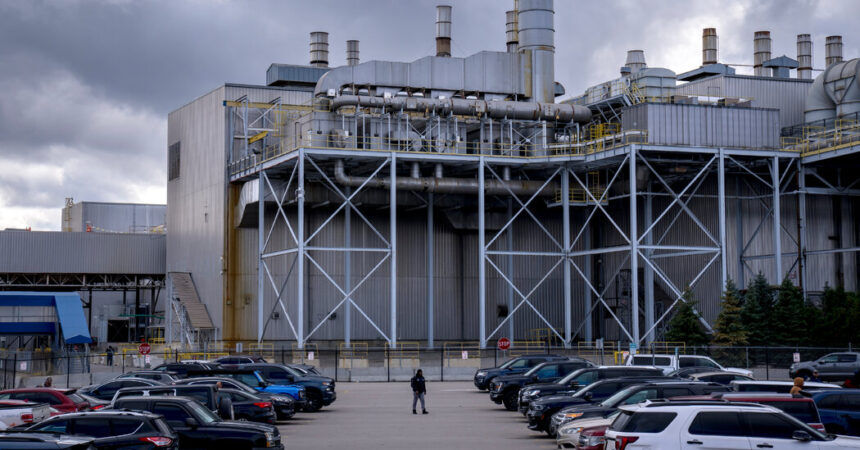President Trump signed a couple of executive orders on Tuesday that some tariffs for car manufacturers, eliminating the levies that Ford, General Motors and others have complained for the manufacture of us when increasing to their teacher.
The changes will modify Mr. Trump’s tariffs, so automobile manufacturers paying a 25 percent tariff on car imports are not subject to other levies, for example, in steel and aluminum, or for certain imports of Canada and Mexico, according to orders. However, the rules do not seem to protect car manufacturers from tariffs on steel and aluminum that their suppliers pay and pass.
Automobile manufacturers can also qualify for the relief of the rate for a proportion of the cost of their imported components, although these benefits will be eliminated in the next two years.
In A Michigan on Tuesday night, Trump said he was showing “a bit of flexibility” to car manufacturers, but that wanted their components to do in the United States.
“We cool them a little before laughing if they don’t do this,” he said.
The decision to reduce the scope of rates is the last sign that the Trump administration decision to impose rigid taxes on almost all business partners has created economic challenges and uncertainty for US companies. But even with the concessions announced on Tuesday, administration policies will add thousands of dollars to car prices and endanger the financial health of car manufacturers and their suppliers, analysts said.
Trump signed the executive orders aboard Air Force One while flying to Michigan, home of the largest car manufacturers in the United States, for a speech that marks his 100 days in office.
Automobile manufacturers have welcomed any relaxation of tariffs, which said that would increase car prices, would cause sales to fall and threaten their financial viability. But the steps will leave in place a rate of 25 percent on imported vehicles that affect April 3, and a rate on cars that will enter into force on Saturday. That will still increase the prices of new cars and used by thousands of dollars and increase the cost of repairs and insurance premiums.
On Tuesday, General Motors left a previous forecast for a solid growth of profits this year as a result of the uncertainty created by Mr. Trump’s commercial policies. The car manufacturer, which sells more vehicles in the United States than any other company, said that any profit prediction would be an “assumption.”
“You can’t trust the previous guide,” said Paul Jacobson, Financial Director of GM, Duration said a telephone conference with journalists.
The car manufacturer also postponed a telephone conference with financial analysts to discuss its results of the first quarter, citing the expected change of the Trump administration to the tariff policy. The company will now make the call on Thursday.
The measure occurs only one week after the administration exempt smartphones, computers, semiconductors and other electronic of their China Punishes on Conerns de Companses such as Apple that import taxes would cause the prices of US consumers to shoot.
On Tuesday, Howard Lutnick, Secretary of Commerce, said the changes voted for direct conversations with manufacturers of national cars, and that the administration had been in “constant contact” with the companies to analyze their business and make sure that the policy was exactly correct.
“Donald Trump and his presidency will bring back the domestic car manufacture,” Lutnick said.
The Trump administration has not admitted that tariffs will hurt car manufacturers. But on Tuesday he seemed to recognize that reverting the rates would help them. In an order signed on Tuesday, the president said that the changes would help reduce the dependence of the industry in foreign manufacture and encourage companies to expand their national production.
For a year, the Administration will sacrifice car manufacturers an exemption from car rates of their car for 15 percent of the suggested retail price of the manufacturer or a car gathered in the United States. That would fall to 10 percent in the second year, and then it would be eliminated in the third year.
Automobile manufacturers that meet cars in the United States may request this call compensation by presenting documentation to the Government on their projected imports and tariff costs.
In a second executive order, Mr. Trump detailed new rules that will exempt companies that will pay a type of tariff when paying others. The president said that when an import was subject to multiple children of rates, tariffs should not “be stacked” one on top of the other, “the resulting tariffs were higher than necessary.
The order said that cars manufacturers who paid a 25 percent tariff to bring cars and car parts would not be subject to tariffs Trump had put in steel and aluminum or in imports from Canada and Mexico.
The products that are subject to tariffs on imports from Canada and Mexico will no longer be subject to tariffs on steel and aluminum, according to order. But he said that the products that were charged tariffs on their steel content would still be charged tariffs on any aluminum content.
Other Dekens will still be charged for all articles, including the rates that Trump has imposed on China and the rates imposed by commercial violations, such as dumping and unfair subsidy.
The latest rules also leave an exemption for the imported pieces of Canada and Mexico that a treaty occurred that Trump negotiated in cash his first mandate. Both countries are the main suppliers of the United States automotive industry.
The exemption buys some car manufacturers, said Lenny Larocca, leader of the United States automotive industry at the KPMG consulting firm. “It gives them a little time to plan what their strategy could be,” he said.
But car manufacturers and suppliers say that two years is not enough for time to reorganize their manufacturing operations. Even if they do, they will not be able to make many components as cheap in the United States as they do in other places, which will lead to higher prices.
Even cars manufactured in the United States generally use much more imported parts of those that would be covered by an exemption. Most cars also contain components of Japan, South Korea or China that will be subject to rates.
“Relief today does not solve the long -term challenge,” Bernstein analysts said in a note on Tuesday. “The prices of the American car are directed, just when the economic impulse fades.”
Neverberthes, car executives expressed their gratitude that Trump had approached at least some of his groups. In a statement on Monday, Mary T. Barra, executive director of GM, said the company appreciated “productive conversations with the president and his administration.”
“The president’s leadership is helping to level the field of playing for companies like GM and allowing us to invest even more in the US economy,” he said.
“Stellantis appreciates the tariff assistance measures decided by President Trump,” said John Elkann, president of the owner of Dodge, Jeep, Ram and Chrysler, in a statement. “While we further evaluate the impact of tariff policies on our US operations, we expect our continuous collaboration with the US administration to strengthen a competitive US automotive industry and stimulate exports.”
Executives also hinted that they expected continuing conversations with administration officials to lead to new concessions. “We will continue working in close collaboration with the administration in support of the president’s vision for a healthy and growing automotive industry in the United States,” said Jim Farley, executive director of Ford, in a statement.
The exemption seems to have been designed in part by Mr. Lutnick, who has played a role in obtaining lucrative exemptions for some industries in recent months. In a statement on Monday, he called the agreement “a great victory for the president’s commercial policy” and said he would provide “track for manufacturers who have expressed their commitment to invest in the United States.”
Veronique de Rugy, a member of the senior research of the Mercatus Center, described the movement as “Shakedown” by the Trump administration, saying that he had imposed pain on car manufacturers and then demanded promises of investments from them.
“Trump tariffs created a crisis for car manufacturers, and now the administration is offering partial relief,” he said.
Neal E. Boudette and Tony Romm Contributed reports.







